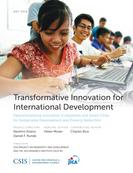Transformative Innovation for International Development: Operationalizing Innovation Ecosystems and Smart Cities for Sustainable Development and Poverty Reduction

This report is the first annual report on the results of joint research between the Center for Strategic and International Studies (CSIS) and JICA Research Institute (JICA-RI) on the theme of innovation that contributes to development. "Transformative innovation," or system-level innovation that shifts the existing system toward a totally new and sustainable way of operating, holds certain promise for developing countries seeking high-yield economic growth. One can look to the rise of the Internet in the 1990s as an example of this kind of transformation. This report looks at the how of operationalizing transformative innovation by focusing on two concrete opportunities for developing contexts: innovation ecosystems and smart cities.
Innovation ecosystems are environments that encourage the innovation of new ideas that respond to "what is needed by a society, market or individual." In developing countries, one or all of the elements for supporting innovation - human capital, financial capital, physical infrastructure and enabling policies - may be missing from an ecosystem.
This report analyzes Fabrication Laboratories or "Fab Labs," which are outfitted with 3-D printers, laser cutters and the like, as potential catalysts for constructing and connecting new innovation ecosystems in the developing world. This report discusses the example of Fab Lab Bohol in the Philippines, the establishment of which involved Japan Overseas Cooperation Volunteers. This report treats fab labs as public goods since they are innovation-enabling platforms. It emphasizes the need for bilateral donors and multilateral organizations to provide initial funding and capacity building while enabling Fab Labs to pursue revenue generation.
As urbanization proceeds around the world, particularly in Asia and Africa, there are expectations for sustainable, energy-efficient and environmentally conscious growth through the use of new technology. Such smart city technologies are a critical tool for transforming urbanization from a challenge into a global social dividend.
This report considers the opportunity of transforming Jakarta, Indonesia, into a smart city. In the Jakarta metropolitan area, the government of the Special Capital Region of Jakarta established a Smart City Unit in the government office. In addition to directly responding to citizen demand, it collects big data and processes it to drive accountable governance and improve services delivery. In relation to the role of donors and multilateral organizations that support such initiatives, the report addresses the JICA-funded mass rapid transit system in Jakarta and a joint crediting mechanism (JCM) in Indonesia - a carbon trade scheme between Indonesia and Japan - from the perspective of introducing new technology.
The report concludes that transformative innovation approaches can enable a new path to economic growth, sustainable development and poverty reduction, if scaled to their potential and made sustainable. The report also points out that innovation ecosystems and smart cities approaches are disrupting the traditional way of doing international development, so development practitioners should embrace this disruption and understand the potential for tools such as Fab Labs to catalyze transformative innovation.
scroll